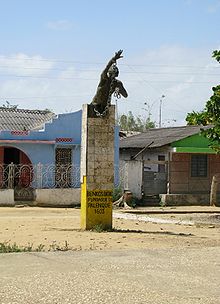- San Basilio de Palenque
-
San Basilio de Palenque or Palenque de San Basilio is a Palenque village and corregimiento in the Municipality of Mahates, Bolivar in northern Colombia. In 2005 the village was declared Masterpieces of the Oral and Intangible Heritage of Humanity by UNESCO. Palenque is also considered the first free town in America[1]
Contents
The Village
The village of Palenque de San Basilio has a population of about 3,500 inhabitants and is located in the foothills of the Montes de María, southeast of the regional capital, Cartagena.[2] The word "palenque" means "walled city" and the Palenque de San Basilio is only one of many walled communities that were founded by escaped slaves as a refuge in the seventeenth century.[2] Of the many palenques of escaped slaves that existed previously San Basilio is the only one that survives.[2] Many of the oral and musical traditions have roots in Palenque's African past.[2]
The village of San Basilio is inhabited mainly by Afro-Colombians which are direct descendants of African slaves brought by the Spanish during the Colonization of the Americas and have preserved their ancestral traditions and have developed also their own language; Palenquero. In 2005 the Palenque de San Basilio village was proclaimed Masterpiece of the Oral and Intangible Heritage of Humanity by UNESCO.
In the village of Palenque de San Basilio most of its inhabitants are black and still preserve customs and language from their African ancestors. In recent years people of indigenous ancestry have settled at the borders of Palenque, being displaced earlier by the Colombian civil war. The village was established by Benkos Bioho sometime in the 16th century.
Palenquero language
Main article: PalenqueroThe New York Times reported on October 18, 2007 that the language spoken in Palenquero is thought to be the only Spanish-based Creole language still alive worldwide and the grammar is so different from Spanish, that Spanish speakers cannot understand it.[3] The language Palenquero was influenced by the Kikongo language of Congo and Angola, and also by Portuguese, the language of the slave traders who brought African slaves to South America in the 17th century.[3] Exact information on the different roots of Palenquero still lack, and there are different theories of it´s origin. Today fewer than half of the community’s 3,000 residents still speak Palenquero.[3]
A linguist born in Palenquero is compiling a lexicon for the language and others are assembling a dictionary of Palenquero.[3] The defenders of Palenquero continue their struggle to keep the language alive.[3] “Our ancestors survived capture in Africa, the passage by ship to Cartagena and were strong enough to escape and live on their own for centuries," said Mr. Salgado, a schoolteacher.[3]
Notable residents
- Antonio Cervantes
- Evaristo Márquez
References
External links
Categories:
Wikimedia Foundation. 2010.


